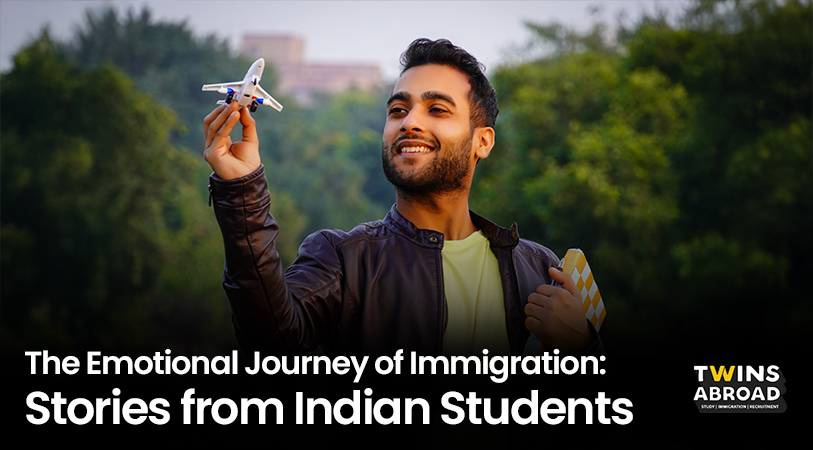The Emotional Journey of Immigration: Stories from Indian Students
Immigrating to a new country for education is one of the most profound experiences an Indian student can undertake. Beyond securing admissions, visas, and accommodation, there lies a deeply emotional and transformative journey. Leaving behind family, friends, familiar surroundings, and cultural norms can be both exhilarating and overwhelming. While the academic benefits are undeniable, the emotional highs and lows that students face often remain understated.
In this blog, we explore the emotional journey of immigration through the lens of Indian students—understanding their struggles, triumphs, and personal growth as they carve new lives abroad.
The Dream: Excitement and Aspirations Before Departure
For many Indian students, the journey begins with a dream. The dream of studying at prestigious universities, experiencing new cultures, and opening doors to international careers.
The excitement leading up to departure is palpable. Days are filled with visa interviews, shopping for essentials, attending farewell parties, and receiving advice from family members. Amidst all the chaos, there is an underlying sense of pride—the knowledge that one is about to take a significant step toward a brighter future.
However, this excitement is often accompanied by anxiety. Thoughts of adapting to a new education system, making friends, managing finances, and living independently start to surface. It’s a bittersweet feeling—a cocktail of hope, nervousness, and ambition.
The First Goodbye: Navigating Separation Anxiety
The airport goodbyes are often the first emotional hurdle. Saying goodbye to parents, siblings, and close friends can be heart-wrenching. For many Indian students, family bonds are deeply rooted, and physical separation magnifies emotional dependence.
At this point, doubts may creep in. Is it the right decision? Will I manage alone? Watching loved ones disappear from view after boarding the flight often triggers the first intense wave of loneliness.
This is a crucial moment where students begin to understand that the journey ahead is not just academic but deeply emotional.
The Initial Days Abroad: The Highs and Lows of Adjustment
Upon arrival in a new country, the initial excitement is invigorating. New sights, languages, foods, and customs create a sensory overload. Orientation weeks at universities, city tours, and meeting fellow international students offer a sense of belonging and shared adventure.
Yet, as the novelty wears off, challenges start to surface.
- Cultural Shock: Adjusting to different social norms, communication styles, and even classroom behaviors can be overwhelming. Simple things like making small talk, following classroom etiquette, or navigating public transportation require conscious effort.
- Homesickness: Festive seasons like Diwali, Holi, or family birthdays become particularly painful reminders of home. Social media can sometimes worsen homesickness, showing friends and family celebrating together.
- Self-Doubt: Academic pressure, job hunts, and comparison with peers can trigger imposter syndrome. Questions like “Am I good enough?” or “Did I make the right decision?” often arise.
This adjustment phase varies in length and intensity. Some students acclimate within months, while others continue to struggle emotionally for a longer time.
Building a New Life: Creating Support Systems
One of the key survival strategies Indian students adopt is building new support systems. Making friends, finding mentors, and joining student communities become lifelines in a foreign land.
Universities often have Indian student associations, cultural clubs, and international student centers that provide emotional and practical support. Sharing meals, celebrating Indian festivals together, and helping each other with studies or part-time jobs slowly recreate a sense of family.
Students also learn the importance of mental health during this phase. Therapy services, meditation sessions, and self-care routines like yoga and journaling help in coping with emotional turbulence.
Building these new support networks is not just about survival—it is about thriving and forging bonds that often last a lifetime.
Facing Discrimination and Bias: Hard Lessons
While most international experiences are positive, many Indian students encounter subtle (and sometimes overt) forms of racism or xenophobia. Accent bias, cultural stereotypes, or assumptions about academic abilities can be disheartening.
For example, students might face difficulties renting apartments, finding part-time jobs, or even getting fair opportunities in internships. Navigating such biases can either be a deeply isolating experience or a call to action—prompting students to educate, stand up for themselves, and find allies.
Learning to deal with discrimination teaches resilience, empathy, and the importance of advocacy for one’s rights. It becomes an integral part of the emotional journey.
Financial Pressure and Work-Life Balance
For many Indian students, studying abroad is a massive financial investment for their families. The pressure to succeed academically and secure part-time jobs to ease the financial burden is immense.
Balancing university coursework with part-time jobs—whether as retail assistants, campus tutors, or freelance workers—often leads to exhaustion. Sacrificing sleep, social life, and sometimes mental peace becomes a norm.
This financial stress can deepen emotional struggles, leading to feelings of guilt, helplessness, or isolation. However, it also instills invaluable life skills—time management, financial planning, negotiation, and sheer grit.
Over time, students learn how to balance priorities, advocate for better work conditions, and value both hard work and self-care.
Triumphs and Growth: The Evolution of Self
Amidst the chaos, self-doubt, and struggle, something extraordinary happens—students transform.
- Resilience: Facing challenges head-on without family to fall back on builds incredible emotional strength.
- Confidence: Achieving academic success, managing living expenses, and navigating a new culture independently boosts self-confidence.
- Adaptability: Experiencing diverse cultures and ways of thinking fosters adaptability—a crucial trait in today’s globalized world.
- Global Perspective: Exposure to international communities broadens worldviews, teaching students to value diversity, inclusivity, and empathy.
These transformations are deeply emotional and irreversible. Indian students who return home or continue abroad are never quite the same—they are stronger, wiser, and more self-assured.
How Families Play a Role in Emotional Well-being
Family support, even from thousands of miles away, remains crucial. Regular video calls, emotional encouragement, financial support when needed, and simply being “there” (even virtually) can make all the difference.
Interestingly, many families also experience their own emotional journeys. Watching a son or daughter grow independent, manage setbacks, and build new lives abroad often fills parents with mixed emotions—pride, nostalgia, and longing.
Acknowledging and nurturing this emotional connection is essential for the well-being of both students and their families.
The Ongoing Journey: Immigration as a Lifelong Chapter
Immigration is not a one-time event—it is an ongoing journey. Whether students choose to return to India, settle abroad, or lead a cross-border lifestyle, the emotional experiences of their student years continue to shape them.
They carry with them not just degrees but also memories of struggles overcome, friendships forged, values redefined, and a selfhood expanded beyond borders.
Every festival celebrated far from home, every winter survived, every job secured, and every heartbreak endured is a testament to their emotional evolution.
Conclusion
Behind every immigration statistic is a human story. Behind every student visa is a journey of hope, fear, courage, and transformation. The emotional journey of Indian students studying abroad is deeply personal, yet universally resonant.
By understanding and honoring these emotional experiences, universities, policymakers, families, and communities can better support the next generation of global citizens. For students themselves, recognizing that it’s okay to feel overwhelmed, to struggle, and to grow at their own pace is the key to embracing this extraordinary chapter of their lives.
Immigration may begin with crossing borders, but its real power lies in crossing internal frontiers—and discovering who you truly are on the other side.


Leave a Reply